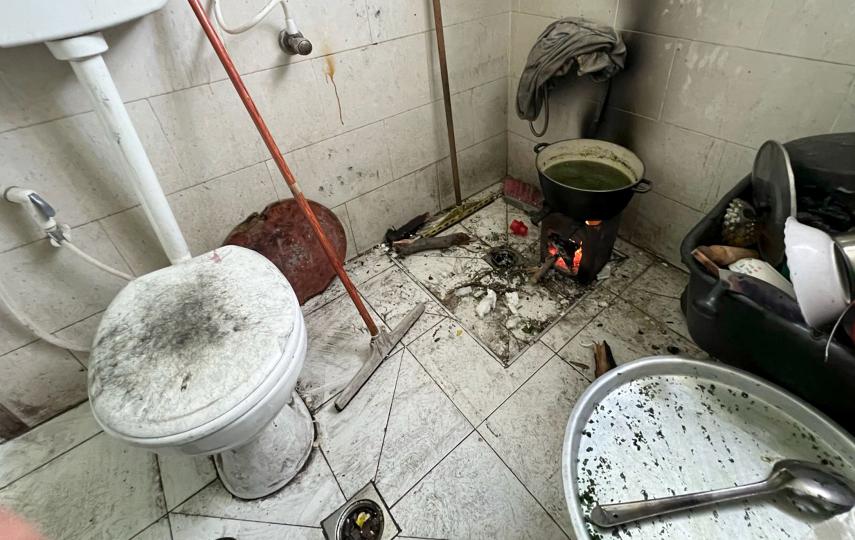LUSAKA
Zambia is struggling to combat an outbreak of cholera, a disease associated with poor sanitation, a lack of hygiene and access to potable water, which has claimed 137 lives, mostly in the capital, Lusaka.
The absence of a solid waste disposal system and potable water in informal settlements, and the unhygienic street vending of fruit, vegetables and other foodstuffs across the country have been identified as the main reasons for the spread of this highly contagious disease.
More than 5,526 cases of cholera have been treated in 26 districts of Zambia since the outbreak began in August 2005. The capital has recorded 116 deaths.
Many of Lusaka's 37 informal settlements, each with a population of around 50,000, depend on shallow wells for water and use pit latrines, which are not serviced by the municipality. The raw sewage from the pit latrines, often located near the shallow wells, contaminates the drinking water.
Street vending as a means of livelihood is common in the informal settlements and city centre, but garbage is often not disposed of in the designated areas, which has also aggravated the problem.
Zambians blame the local government for failing to provide services in the informal settlements in Lusaka, even though some of them have been recognised as legitimate suburbs.
"I am aware about the prevalence of cholera because it has killed a number of my relatives, but we have no option, apart from drawing water from the shallow wells," said Grace Chipampe, a resident of Kalikiliki, a "legalised" settlement 10 km east of Lusaka. "We are forced to live in piles of garbage because nobody bothers to clear it, and even when flies sit on our food we merely continue eating our meals."
In response to the crisis, Zambian health authorities last week gave street vendors 14 days' notice to move to designated areas, where conditions are more hygienic. The government also announced plans to construct markets in Lusaka and the northern towns of Kitwe and Ndola later in the year.
NGOs, like the 'Keep Lusaka Clean' campaign, have underlined the need to implement existing municipal bylaws to maintain hygienic conditions and provide services in recognised settlements.
Even the state-run National Road Transport and Safety Agency (NRTSA) has stepped in to criticise the Lusaka City Council's failure to address street vending.
Martin Mbangu, NRTSA's deputy managing director, said besides being a health hazard, vending also exposed traders and customers to traffic risks. "Street vending is bad, as it contributes to road traffic congestion and allows garbage heaps to pile up around the town centre."
Authorities at Lusaka's City Council said they had intensified efforts to clear garbage in the downtown and residential areas, but added that it lacked resources to adequately address the problem.
"We have visited a number of cholera-prone compounds to chlorinate and lime the pit latrines to kill the germs," said Chimuka Mbewe, a spokeswoman for the council, which has a fleet of only 10 vehicles to cover a city with 2.5 million residents. "We have not done very well in solid waste management because of [the lack of] resources."
The council's claim has been backed by Local Government Minister Andrew Mulenga, who commented, "Our greatest setback is the irregular support [grants] from the central government."
Former municipal officials acknowledged that the lack of resources to provide adequate housing and trading areas had forced municipalities to turn a blind eye when bylaws were flouted.
Levy Mkandawire, previously mayor of Lusaka, said the increased demand for shelter in the capital had forced the municipality to recognise 37 informal settlements, although it lacked the funds to provide services. "There has been pressure on the local authority to provide shelter to the ever-increasing population in Lusaka, and we have decided to recognise most of the illegal settlements so that, someday, we shall provide services."
The government announced last month that it planned to spend more than US $760,000 to control the spread of cholera and improve sanitary conditions in Zambia. Health Minister Sylvia Masebo told parliament that the government had managed to raise about half that amount, with the assistance of the UN's World Health Organisation.
While noting poor infrastructure planning, Masebo also laid the blame for the spread of cholera on the failure of informal settlement residents to maintain personal hygiene. "Unless we show commitment as a nation to fighting the disease, the impact would be much greater than the epidemic of the year 2000, in which over 11,000 were affected," she said.
'Make Zambia Clean and Healthy', a campaign that aims to institutionalise hygiene and improve cleanliness in public places and individual homes, has been intensified, Masebo added.
The Zambia Red Cross Society has also stepped up their door-to-door community health education, mainly in Lusaka's Kanyama settlement, where most of the cholera cases have occurred.
This article was produced by IRIN News while it was part of the United Nations Office for the Coordination of Humanitarian Affairs. Please send queries on copyright or liability to the UN. For more information: https://shop.un.org/rights-permissions




